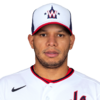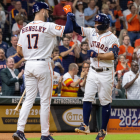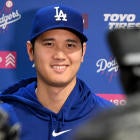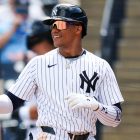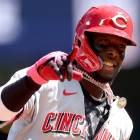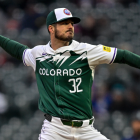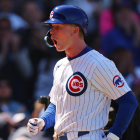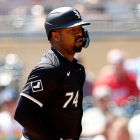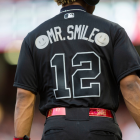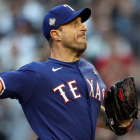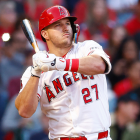
The Houston Astros will be without second baseman Jose Altuve for the start of the 2023 MLB season after he suffered a fractured thumb on Saturday as part of Venezuela's loss to Team USA in the World Baseball Classic. Altuve, who will undergo surgery in the coming days to mend his digit, experienced the injury when he was hit in the hand by a pitch from Daniel Bard.
The Astros did not announce a timetable for Altuve's return. Baseball Prospectus' injury database indicates that the average recovery time from a broken thumb for a hitter is 34 days missed, or about five weeks. Of course, recoveries can vary based on any number of factors, including severity and the team's situation. The Astros will want to ensure that Altuve is hearty and hale upon his return, suggesting they may take a more conservative approach.
With Altuve potentially sidelined until May at the earliest, the Astros now face the unenviable task of replacing his production atop their lineup. Last season, he batted .300/.387/.533 (160 OPS+) with 28 home runs in 141 games. His contributions were estimated to be worth 5.1 Wins Above Replacement, according to Baseball Reference. In turn, he recorded his highest finish in American League Most Valuable Player Award voting (fifth) since his 2017 win.
What options does Astros general manager Dana Brown have? Below we've highlighted some realistic candidates, internally and otherwise.
1. The internal choices
The likeliest, and most straightforward route for Brown and the Astros is to hand the keystone over to a player or two already in the organization. The top candidates are David Hensley and Mauricio Dubón.
Hensley, listed at an unusually tall 6-foot-6 for a middle infielder, made his big-league debut last season. In 16 games, he batted .345/.441/.586. He's shown a strong eye at the plate, as well as a capable line-drive stroke. Hensley isn't young in a conventional sense -- he'll celebrate his 27th birthday just ahead of Opening Day, but his lack of service time makes him a potential long-term piece of the roster if he proves that his contact-driven ways can transfer against MLB-quality pitching. There's league-average upside here.
First career home run for David Hensley! pic.twitter.com/QzZfS3pGee
— Houston Astros (@astros) September 28, 2022
Dubón, 28, has bounced around both the league and the diamond. He joined Houston last May as part of a small trade with the San Francisco Giants, and he spent most of his time with the Astros in center field. Dubón has shown little life at the plate the last two seasons, compiling a 67 OPS+ in 452 plate appearances. He would seem more wisely deployed in a super-utility role, though in this instance he makes for an OK insurance policy on Hensley.
The Astros don't have many other realistic candidates in their organization. The only other infielders on the 40-player roster are Joe Perez and Rylan Bannon. Otherwise, minor-league veteran Dixon Machado, who has appeared in more than 170 big-league games, stands out as the most qualified option.
2. On the trade market
It's difficult to make big trades at this time of the year, since no team wants to send the wrong message to their clubhouse or fan base. The good news, in a sense, is that the Astros would have their sights set lower. They're not seeking a star, or a long-term fit; they just want someone who can come in and do a competent job to begin the season before blending into the background.
It would make sense for the Astros to scope the market for players who are out of minor-league options. Teams are always reluctant to lose talent on waivers, meaning they might be more inclined to make a trade so they can get something back. Alas, this year's class of option-free infielders isn't inspiring. Maybe the Chicago Cubs would part with Zach McKinstry?
This does not seem like a situation where the Astros would be willing to take on bad money from an unwanted contract. In other words, don't expect them to bail out the Cubs on David Bote, or the St. Louis Cardinals on Paul DeJong.
There is one other avenue the Astros can and will explore in the coming days.
3. In free agency
Predictably, given that it's mid-March, there aren't many compelling options left on the open market. José Iglesias is the most compelling name. He's unsigned despite posting a 90 OPS+ last season in 118 games with the Colorado Rockies. He would be well behind the curve in terms of readiness, however, necessitating some time in the minors for him to shake off the rust.
The Astros could wait and see which players take advantage of their status as Article XX(B) free agents. For those unfamiliar with the concept, individuals deemed Article XX(B) free agents who sign minor-league pacts are eligible to opt out of their deals at several dates throughout the season, including ahead of Opening Day, if they're not added to their current team's active roster. Some infielders who could, conceivably, take advantage of that clause: César Hernández (Tigers), Rougned Odor (Padres), and Ehire Adrianza (Braves).
Are any of the above players better than what Hensley could be? Probably not; there tend to be reasons why that player class has to settle for a minor-league arrangement at that point in their careers.
Still, there is something to be said about adding another contingency plan should the opportunity arise -- after all, what happens if Hensley himself suffers an injury between now and Altuve's return? The Astros owe it to themselves to investigate the marketplace and see what's out there. Even if the options prove to be undesirable, they can take solace in knowing that Altuve will be back at some point -- and that the rest of their roster is good enough to keep their record above water until their second baseman takes his next cut.









